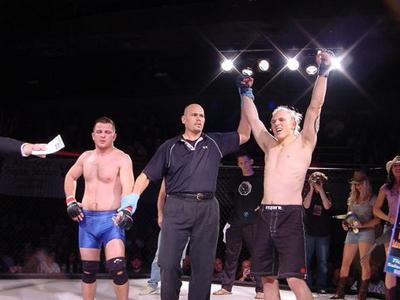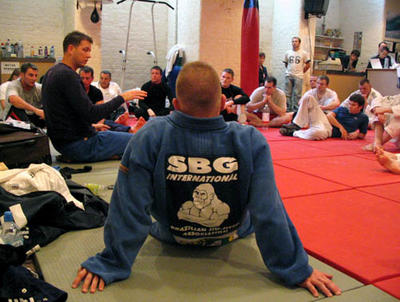Last night I attended a lecture featuring my friend, and fellow SBG member Pete Boghossian titled:
‘Jesus, the Easter Bunny and other delusions, just say no!’
As you might imagine the title of the talk has drawn some attention, and that’s a good thing. Pete was featured on talk radio, the newspaper, podcasts, and also received some promotional help courtesy of Sam Harris, Michael Shermer and others.
Pete’s thesis is simple enough, that “faith” defined simply and accurately as ‘belief without evidence’ (after all where you have evidence you don’t need faith), is an unreliable process. Faith takes you farther away from the truth, rather then closer. And by truth, he simply means a more lawful alignment between your beliefs, and actuality itself.
Over the years many of us who’ve been engaged in these conversations with the delusional have realized that the root of the problem, the very core of the issue, isn’t religion, it isn’t pretending to know there is a god, it isn’t even belief in other forms of superstition, though all those things certainly fall under the category of delusions, what it is, is “faith”. Faith is the very foundation from which all these delusions spring, and as such, by addressing the issue of faith head on, you attack the problem at its very heart.
Fortunately this lecture was filmed properly, as was the hour-long question and answer period that followed. Once I get a copy I’ll post it here, so I wont detail the case Pete made during his 35 minute talk; suffice it to say, it was air tight. You don’t try to measure a door by sacrificing a goat, or using divination. Likewise, conclusions that are the result of faith-based processes, things such as astrology, homeopathy, and the power of prayer, have all been shown, conclusively, to not work. Again, faith based processes lead one farther away from truth, not closer.

The morning of the talk Pete and I discussed the question and answer period that would follow, and I made a prediction.
Having seen enough of these events, and having had enough of these conversations, I’ve realized that there are really only three ‘forms’, or versions of questions that those who believe in faith based ideas will offer up.
To be even more precise, there are only really two forms of argument in defense of faith offered by most people, and one additional form which is usually presented by the left, and popular in areas where liberalism is more common.
The first of these forms of argument is a bit of a shell game, it is the shift, which the questioner usually hopes goes unnoticed, between arguing that something is actually ‘true’ (be it belief in a God, homeopathy, astrology, scientology, prayer, insert woo-woo here), to the argument that while perhaps not ‘true’, it is still ‘useful’.
A couple things to note here, first of all that’s a very different argument; and as I stated, it is a difference believers in all forms of delusion usually hope goes unnoticed. Secondly, it is also for the most part, untrue; and I will explain why in detail in future essays. And third, even if it were true, and I don’t think it is, one would still be left asking whether the damage delusional thinking causes is worth the imagined ‘comfort’ people are claiming can come from it. It could in fact be akin to giving someone cancer in order to treat a headache. Again, I will deal in depth with this one in future articles, and I will explain how Pete dealt with this non-sequiter in moment.
The second form of argument people take is the attempt, in one disguise or another, to conflate the processes of science and reason to that of superstition. This pseudo argument takes a million different profiles, but if you listen carefully to the questioner you will discover it is always this same fallacy.
And finally, the third form of argument taken in defense of faith based processes, one that is usually offered up by those of a more liberal persuasion, and one which, sadly, has infected a great deal of academia, is the relativist argument; the my truth is not your truth, all ‘truths’ are equal mentality. Of the three arguments,this one is perhaps the most ironic, because it tends to be both the silliest, as well as the one adopted by some of the most educated of the lot. It seems to take a great deal of education, or more properly stated indoctrination, in order to adopt this particularly absurd delusion.
Given those three forms of argument, and outside of flatly and sincerely arguing that something is actually true, i.e. that (insert delusion here) does indeed work, these are the only three forms of argument you will ever usually hear, Pete took great care in anticipating and addressing in advance at least two of them.
For the relativist, Pete stated at the start of his lecture, “I am not a relativist, if you are, then there is likely nothing I can do or so to persuade you otherwise.”
Given the insipid nature of relativist arguments, I think that was a more then sufficient response.

For the second argument, the bait and switch from this works, in the case of this lecture that faith based reasoning works, to this is useful, Pete made the following move prior to ending his lecture. First he stated, that he would like to stick just to the thesis of the actual lecture he presented, which was simply, that faith based processes are not a reliable way to arrive at the truth, and as such, he did not want to discuss on that particular night, whether despite these things being ‘false’, they may in fact be useful.
Secondly, he made a prediction. Despite having announced this in advance, he predicted that some questioners would still come up and attempt to make that move. He followed that with one more prediction, that despite predicting that this would happen, people would still try and do it.
Can you guess if he was right?
All in all I think it was a very clever way to pre-frame the question and answer period, and intercept the slight of hand move faith based defenders always like to make when the reality of their delusion is placed in the bright light of clear thinking.
Knowing in advance that Pete was going to make these maneuvers in his talk, it was easy for me to make my prediction; that every question he received would be the same question wrapped in a different costume, the attempt to conflate faith based delusional thinking, with science and reason.
The argument goes something like this:
“You defined faith as ‘belief without evidence’, however, don’t we all use faith in one form or another?”
“Don’t you have ‘faith’ in science and reason?”
“Isn’t trusting reason itself a matter of faith?”
“Atheists say there is no god, believers say there is a god, don’t both positions take faith?”
And on and on it goes. To be clear, these questions are always fallacious. Comparing faith based reasoning to the scientific process, and keep in mind science and critical thinking are processes not conclusions, is akin to comparing a disease to its cure; but only always.

I probably don’t have to give you the punch line to this essay, my prediction was of course correct. Every question Pete received was either a variation of the artifice above, or it was an attempt to sneak in an “it’s useful” or “isn’t it all relative” question, despite the warnings given prior. Again, there seems to be only three forms of arguments.
Just to be clear, I would love to be proven wrong on this. I would like nothing more then to hear a new ‘form’ of argument offered by someone who does believe in faith based ideas, it would be an opportunity for me to learn; but sadly, no such argument ever seems to manifest.
The last questioner of the night managed to wrap the entire evening in a neat bow when they asked a variation of the science requires faith fallacy using almost all of the examples I listed above. It went something like this:
“Doesn’t your belief in reason and science as an answer to objective questions also require faith? I stepped on an airplane earlier this week, and it took faith for me to not believe it would crash. And by the way, since atheists claim there is no god, and believers say there is, aren’t both parties operating on faith?”
You couldn’t have asked for a better final question.
By this time in the evening, my patience had been worn down. I turned to my wife and commented on Pete’s patience when answering these topics. I can write on these subjects, but I have to admit that during live question and answer sessions I almost always find myself fighting the urge to throw my hands up and say “you’ve got to be fucking kidding me, this again!” It leaves me with even greater admiration for someone like Sam Harris, who answers these same fallacies time and again, without ever once losing his cool. That is certainly a skill I do not have in these situations, but one I would like to acquire.
That said, I couldn’t refrain from answering from my chair, at which point I was asked to use the mic. Here is what I said.
Atheism does not mean one ‘knows’ there is no god. Having read most prominent atheists, and knowing many, I’ve yet to meet one who makes that claim. What atheism means simply, is that one does not ‘believe’ in god. You, turning to the questioner, are probably an atheist when it comes to belief in Zeus, I simply feel exactly the same way about a divine Jesus; also, I wouldn’t fly on a faith-based airplane.
And there it ended.
![[karlchokeschicken.jpg]](http://1.bp.blogspot.com/_-qHUEL1YczU/R04UVrhGZ5I/AAAAAAAAAEw/ppGu50Am_vY/s1600/karlchokeschicken.jpg)











